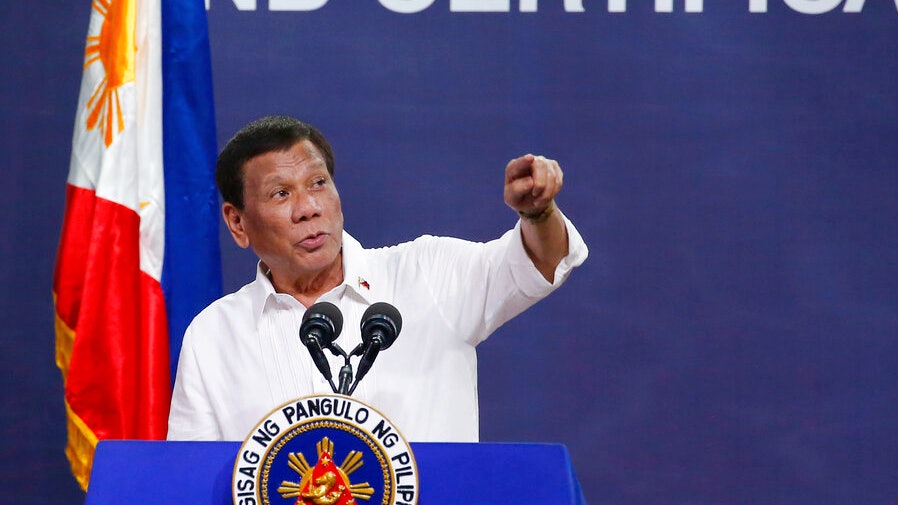Philippine President Duterte arrived in China this afternoon for a five-day visit to China. According to the Philippine side, Duterte will discuss the oil and gas exploration in the South China Sea with Xi Jinping, the collision incident at the Liletan Beach earlier, and the “South China Sea Arbitration Case” that once brought the relationship between the two countries into a trough. This arrangement seems to be “a glimpse of sugar,” but Beijing does not seem to mind.
Before Duterte’s visit to China, Sino-Philippine relations seemed to have experienced some twists and turns. In June this year, China and the Philippines broke out in the waters of the Ritual Beach in justice. The Philippine side accused a Guangdong fishing boat from slamming a Philippine fishing boat in the area, causing 22 people to fall into the water. Fortunately, it was rescued by Vietnamese ships. The Chinese side said that the “Yuemao Binyu 42212” was involved in fishing at the Lile Beach. After being besieged by 7 to 8 Filipino vessels, the Philippines was unfortunately wrecked during the evacuation and tried to search for salvage. The waters of the Ritual Beach incident this time are also the joint development areas stipulated in the Memorandum of Understanding on Oil and Gas Development Cooperation at the end of last year.
As an important economic cooperation project between the two countries, conflicts in relevant places should naturally be resolved. However, Duterte’s first attempt to introduce the “Hague ruling” is interesting. Beijing has always regarded the “The Hague Arbitration Case” as a turning point in the trend of Sino-Philippine relations, and adopted a “no acceptance, no recognition” attitude toward the ruling. Public opinion is concerned about whether Beijing will change its friendly attitude towards Duterte.
Don’t give Du’s a “bonnet”
Whether it is the Western media, or the media of China and the Philippines, it is indispensable to label Duterte as a “pro-China”. Duterte has visited China five times in the past three years since he took office. However, the United States, which has never visited the “Philippine traditional allies,” seems to have indeed taken the title of “pro-China.” However, Duterte also maintains a very good relationship with Japan. When he visited Japan for the third time in May this year, the two countries signed a trade agreement worth 400 billion pesos (about 5.73 billion US dollars) to create 8,000 jobs; earlier, Duter Erte is even more acclaimed that Japan and the Philippines have entered the “golden age of strategic partners.” In this case, it should also be named “pro-Japanese.”
In fact, China and Japan are the top two trading partners of the Philippines. Duterte maintains good relations with the two countries, and more is “for the benefit of the Filipino people.” Duterte also did not “one size fits all” to sever relations with the United States. According to the Philippine military plan, this year the Philippine Army will conduct 281 joint military exercises with the United States, 20 more than the previous year. In response, Manila still attaches importance to the security status of the United States and the Philippines.
However, Duterte knows that the military strength of the Philippines, which is mainly based on post-World War II equipment, is weak, and it is far worse than that of Vietnam, Taiwan, and Singapore. It is even more impossible to “hard-hit” with Beijing. In other words, he only chooses the latter between sovereignty issues and economic development. All countries that can provide economic benefits are “good friends” in the Philippines.
Beijing will continue to use “economic leverage”
In addition to labeling Duterte as a pro-China faction, many people think that the President’s visit to China this time to propose “South China Sea Arbitration” is due to the pressure of domestic great nationalism and has to make a “patriotic oath.” This argument has its merits, but it seems to exaggerate the domestic nationalism of the Philippines. In the mid-term elections of the Philippines in May this year, the opposition played an “anti-China card”, questioning Duterte’s desalination of sovereignty issues and the South China Sea dispute. However, because Duterte launched the anti-drug war “outstanding warfare” and won the support of 75% of the people, such an election strategy does not work. This time, Duterte’s mention of “South China Sea Arbitration” should not be too strong. Beijing must also focus on the “China-Philippines friendship” and dilute the incident.
In fact, Beijing has done a lot of work in appeasing the people of the Philippines. Since the Philippine Constitution establishes the condition of “the country needs 60% of the proceeds” for “commonly opening up national resources,” China will concede to agree to the relevant provisions. In the future, the development of oil revenues of the two countries will be deducted from the cost recovery of the investors. Divided into. Due to the economic gap between the two countries, the “great benefits” that Duterte has won are acceptable costs for Beijing. If you can exchange the benefits of the South China Sea in the middle of the sea, and get through the recent section of the “Maritime Silk Road” in China, it can be regarded as a profit. China’s relatively closed political system has also allowed the government’s decision-making to avoid “nationalist pressure” and directly implement it.
All along, Beijing’s diplomatic strategy for neighboring countries has been centered on “shelving disputes and conspiring interests”. Whether it is for the economic corridor plan of Myanmar and Pakistan, or the plan to “join the Belt and Road” with Japan, it has shown this idea. Duterte’s ruling philosophy also takes economic development as a priority. As long as this “tacit understanding” remains unchanged, “the proposed Hague arbitration case” will not cause any storms.












